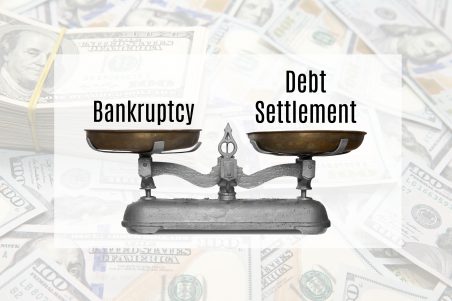Bankruptcy or Debt Settlement?

If you have accrued more debt than your income can feasibly handle, you are not alone. Rising medical, housing, and other living costs have been dramatically outpacing income growth, leaving many to turn to credit cards and loans to pay their monthly bills. The average US household carries nearly $17,000 in credit card debt and about $137,000 in overall debt.
While some households earn sufficient incomes to pay off their debts within a reasonable timeframe, others would face a lifetime of financial hardship if they chose to tackle their debt with traditional month-to-month payments – and that’s if they could even make monthly payments in the first place.
So, what debt relief options are available to individuals with crushing debts that would take a lifetime to repay? Here, we’re going to compare two debt relief options: bankruptcy and debt settlement.
What is bankruptcy?
Bankruptcy is a legal process where a judge and court-appointed administrators, or trustees, review the details of your finances to determine if your liabilities, or debts, exceed your assets to the extent repayment is unlikely. If the court rules in your favor, your debts are discharged, meaning you are no longer legally obligated to pay them.
What steps do you need to take to file for bankruptcy?
Filing for bankruptcy isn’t just a matter of throwing in the towel. There is a lengthy, complex process you must follow:
- First, you must gather and list all your financial records, including debts, assets, income, and regular expenses.
- The next step is credit counseling. If you do not receive credit counseling from a court-approved agency within 180 days before filing for bankruptcy, your case will be dismissed. This step is to ensure you have exhausted all other options to repay your debts.
- Now, you would file the petition for bankruptcy. Because there are many forms to fill out, different types of bankruptcy, such as Chapter 7 and Chapter 13, and conflicting state and federal bankruptcy laws, hiring an experienced lawyer will increase your odds of success as improper filings may cause the court to reject your petition.
- The final step in the proceedings is usually a meeting with your creditors who can ask questions to better understand your case.
Not including credit counseling, bankruptcy proceedings can take six months or longer from the date your petition was filed.
Who would benefit the most from bankruptcy?
Bankruptcy may benefit individuals with some combination of mortgage and credit card debt, medical bills, student loans, and other forms of debt. While bankruptcy does not discharge some forms of debt, such as federal student loans and taxes, it provides an “automatic stay”. A stay is basically an instruction to creditors to halt all collection processes, including calls, wage garnishments, lawsuits, or even evictions.
What is debt settlement?
The term debt settlement is often confused with debt consolidation, but they are two very different programs. While you are still paying your full account balances with a single, low interest loan with debt consolidation, debt settlement lowers the interest and amount you pay on your accounts through good old-fashioned haggling.
How does debt settlement work?
A team of financial experts will negotiate with creditors on your behalf to slash the amount you owe. You will be asked to halt any payments to your credit cards and begin paying into an escrow account – think of this account as your bargaining chip; your settlement team will have more success when creditors know you have something serious to bring to the negotiating table.
Debt settlement is generally designed to take between 3 and 4 years to complete; though, some programs may take as little as just over 2 years. Factors such as your ability to contribute regularly to an escrow fund, the amount you’re able to contribute, and the magnitude of your debt will influence completion times.
It is important to note that creditors can still refuse to negotiate and may pursue legal action, though this is rare under the guidance of an experienced debt settlement company.
Who would benefit the most from a debt settlement program?
While the program isn’t suitable for everyone, debt settlement may be for those who are seeking an alternative to bankruptcy or who do not qualify for Chapter 7 bankruptcy, which would relieve one of legal responsibility for repaying debts. Additionally, consumers whose debt is primarily composed of credit card debt tend to enjoy greater reductions in the balance owed.
Conclusion
Although bankruptcy and debt settlement will damage your credit score, potentially carrying long-term financial consequences, both provide an opportunity or second-chance to get your finances back on track. Whichever path you choose will ultimately depend on the unique circumstances of your situation.
To learn more about debt settlement and whether it is the best option for you, please take a look at our Debt Settlement FAQs or feel free to contact New Era Debt Solutions’ team of financial experts.
You can also fill out our form below for your free debt analysis.
